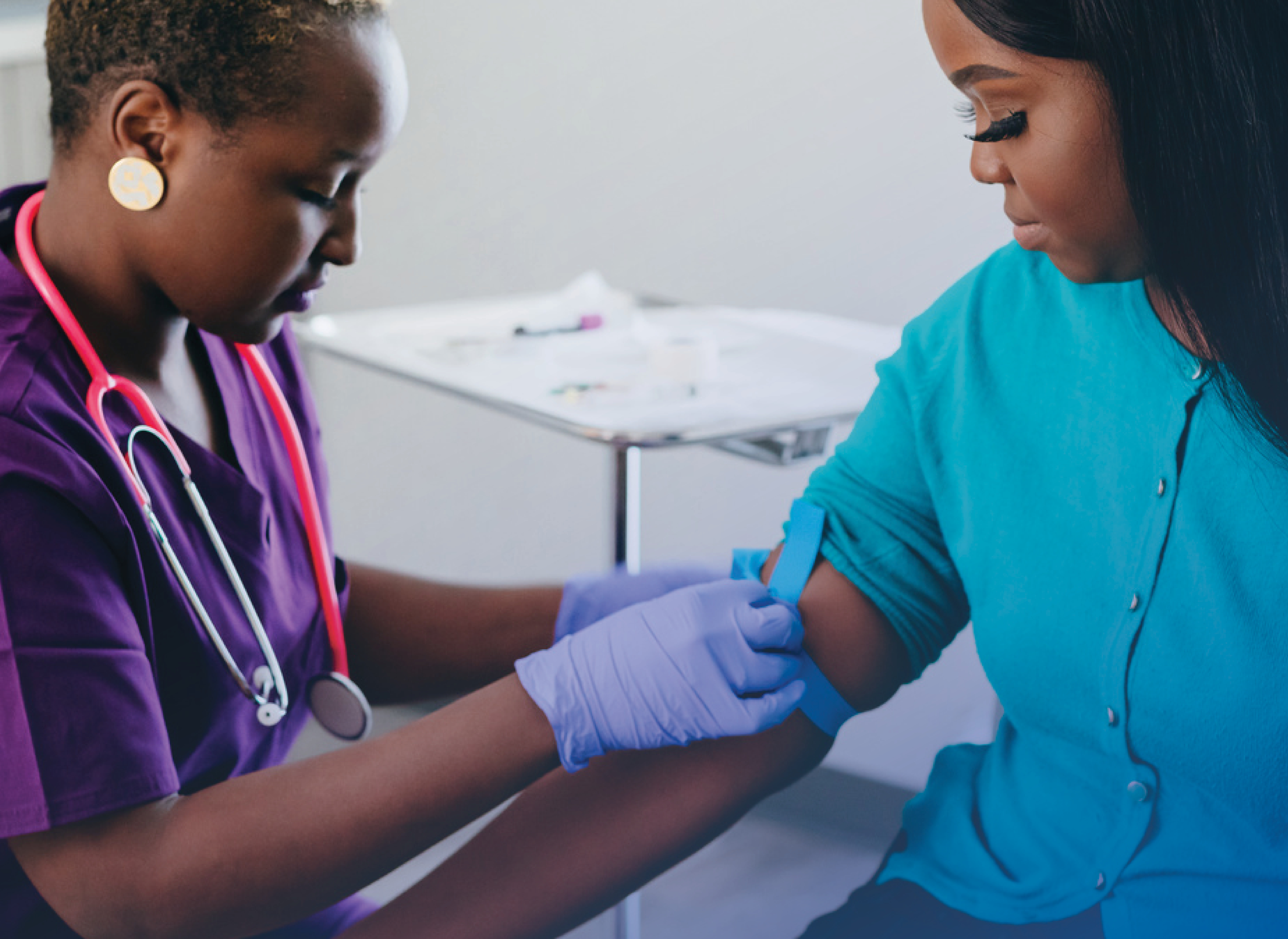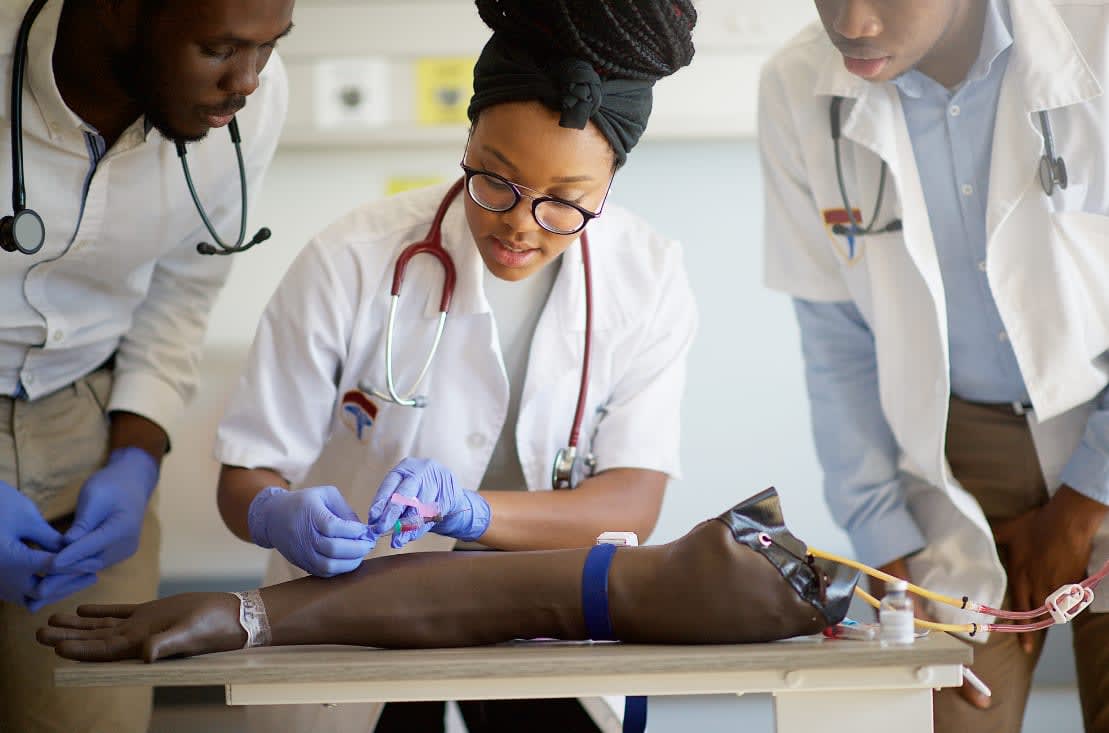Your Essential Plan to Starting Phlebotomy school With Confidence
Your Essential Plan to Starting Phlebotomy school With Confidence
Blog Article
The Course to Qualification: Understanding the Phlebotomy Educating Program Trip and Its Value
As you consider the path to certification in phlebotomy, it's crucial to comprehend the function you'll play in health care. Your training will cover vital abilities, from blood collection methods to patient interaction.

The Duty of Phlebotomists in Medical Care
Phlebotomists play a crucial duty in the health care system, serving as the essential web link in between clients and important diagnostic screening. You'll do blood draws, ensuring samples are accumulated properly and securely. Your experience aids in identifying clinical problems, keeping an eye on wellness, and assisting therapy choices.
In your day-to-day communications, you'll need to develop count on with patients, making them really feel comfortable throughout what may be a demanding experience. You are in charge of identifying and taking care of examples carefully to protect against contamination or errors, which can affect examination results.
Yet, you'll typically work along with physicians and nurses, communicating vital information concerning individuals' conditions. Your duty is fundamental in keeping the workflow in healthcare setups, making certain timely and exact results. By understanding your skills, you add meaningfully to individual treatment, making you an important component of the medical group. Embracing this obligation is vital to your success as a phlebotomist.
Introduction of Phlebotomy Training Programs
When exploring phlebotomy training programs, you'll locate numerous kinds developed to fit different routines and discovering designs. Each program assists you develop essential abilities like blood collection and client interaction. Comprehending these choices is crucial to picking the ideal course for your occupation.
Kinds Of Training Programs
Numerous types of training programs are readily available for those looking to end up being skillful in phlebotomy. In addition, some healthcare facilities and centers use on-the-job training programs, offering sensible experience while you discover. Whatever course you choose, each program intends to equip you with the needed abilities for a successful phlebotomy job.

Trick Skills Established
Understanding phlebotomy requires a set of essential abilities that are developed through detailed training programs. You'll learn technical skills like appropriate blood vessel option, needle insertion, and blood collection techniques. These hands-on methods assure you can carry out procedures securely and successfully. In addition, communication skills are fundamental; you'll need to communicate with individuals, clarify treatments, and placed them comfortable. Understanding anatomy and physiology is vital, as well, as it assists you find blood vessels and recognize the body's response to blood attracts. Ultimately, you'll gain knowledge of safety methods and infection control, ensuring you maintain a sterile environment. Each of these skills is important for your success as a qualified phlebotomist, making you a beneficial asset in any kind of medical care setting.
Secret Elements of a Phlebotomy Program
In a phlebotomy course, you'll concentrate on necessary topics that lay the groundwork for your future career. You'll involve in hands-on training that allows you to use what you've found out in real-world settings. Both the curriculum and useful experience are essential for your success as a phlebotomist.
Curriculum Overview
While going after a phlebotomy training course, you'll encounter a curriculum developed to outfit you with fundamental abilities and knowledge. Phlebotomy Training Course. This educational program generally consists of anatomy and physiology, concentrating on the circulatory system and comprehending blood parts. You'll likewise find out about different sorts of blood collection methods, including venipuncture and capillary slit strategies
Additionally, infection control and security procedures are vital elements, ensuring you understand exactly how to preserve a sterilized atmosphere. You'll examine patient interaction, highlighting communication and empathy, which are crucial for relieving individual stress and anxiety.
Hands-On Training Experience
Getting hands-on experience is an important part of your phlebotomy training program. This functional training allows you to use what you have actually learned in a real-world setup, improving your skills and self-confidence. Phlebotomy Classes Near Me.
Furthermore, you'll get the opportunity to communicate with patients, which is crucial for establishing your interaction skills. This mix of technical proficiency and social abilities is important for your success as a certified phlebotomist. Inevitably, hands-on training is where theory satisfies practice, solidifying your expertise and readiness for qualification.
Accreditation and Licensing Needs
Before you can begin your career in phlebotomy, it is important to recognize the accreditation and licensing demands that differ by state. The majority of states require phlebotomists to hold a qualification from a recognized company, such as the National Phlebotomy Association or the American Culture for Medical Pathology. These qualifications generally entail passing an exam that evaluates your understanding and abilities in the field.
In addition to accreditation, some states have details licensing demands. You might require to complete a particular variety of hours in clinical method, submit evidence of training, or undertake a history check. It is necessary to research your state's policies to make certain you fulfill all essential criteria.
Staying notified regarding these needs not just aids you secure a position however likewise improves your credibility as a professional. By satisfying these demands, you'll be well on your method to an effective occupation in phlebotomy.
Hands-On Training and Practical Experience
Hands-on training and functional experience are crucial parts of your phlebotomy education, as they permit you to use academic expertise in real-world scenarios. Throughout your training, you'll participate in monitored venipuncture, discover appropriate methods, and end up being accustomed to different blood collection equipment. This direct participation is essential for constructing your self-confidence and refining your abilities.
You'll work closely with skilled professionals that can guide you through the subtleties of individual interaction and sample handling. Each practice not just strengthens your understanding however also prepares you for the busy setting of health care settings.
Additionally, numerous programs incorporate professional turnings, enabling you to experience diverse setups, from healthcare facilities to outpatient centers. This exposure aids you adapt to various difficulties and client requirements, guaranteeing you're well-prepared for your future function. Embrace these possibilities, as they're crucial to ending up being a proficient and compassionate phlebotomist.
Obstacles Faced Throughout Training
While acquiring hands-on experience is important, it's vital to acknowledge the obstacles that can develop during your phlebotomy training. You could experience anxiousness when carrying out treatments on genuine patients, particularly if you're brand-new to the atmosphere. The stress to get every little thing right can be overwhelming. Furthermore, grasping the abilities needed for blood attracts takes technique; you may struggle with strategy at first.
Time administration can additionally be a difficulty, as harmonizing theory, sensible sessions, and personal commitments can really feel daunting. You may face differing finding out paces among your peers, causing feelings of insecurity if you believe you're falling back. Finally, adapting to the various personalities of trainers can be challenging, as each may have a distinct teaching design.
Recognizing these obstacles early can prepare you for success and assist you create strength throughout your training journey.
Occupation Opportunities After Accreditation

As you acquire experience, you might also think about focusing on areas like pediatric or geriatric phlebotomy, accommodating specific person requirements. Some phlebotomists select to advance their careers by ending up being lab technicians or seeking more education in health care areas.
In addition, your qualification can cause functions in training or overseeing brand-new phlebotomists, enabling you to share your understanding. With the medical care industry consistently expanding, your skills will certainly constantly be in need, leading the way for a steady and satisfying profession. Embrace the possibilities waiting for you!
Often Asked Questions
What Is the Regular Duration of a Phlebotomy Training Training Course?
Phlebotomy training courses typically last around 4 to 8 weeks. You'll participate in hands-on technique, class direction, and on-line understanding. Finishing this training prepares you for certification and a gratifying job in healthcare.
Are Online Phlebotomy Courses Available?
Yes, on-line phlebotomy training courses are available. They provide versatility and benefit, enabling you to study at your own rate. Just verify the program is approved to satisfy accreditation demands and acquire beneficial abilities for your career.
How Much Does Phlebotomy Training Usually Cost?
Phlebotomy training commonly sets you back in between $700 and $2,500, depending on the program and area. You must take into consideration factors like program size, consisted of materials, and hands-on experience when selecting the right training for you.
What Are Typical Prerequisites for Phlebotomy Training?
Common prerequisites for phlebotomy training often consist of a high institution diploma or GED, booster shots, and a history check. Some programs might likewise require fundamental health care knowledge or certifications, guaranteeing you're gotten ready for hands-on training.
Can I Work While Completing My Phlebotomy Training?
Yes, you can work while finishing your phlebotomy training. Lots of trainees equilibrium tasks with their studies, yet make certain to handle your time effectively to assure you meet Phlebotomy school both work and training commitments effectively.
Report this page